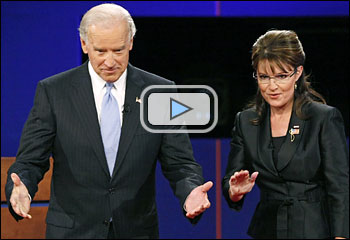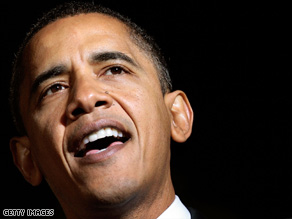
Friday, October 3, 2008; Page A01
ST. LOUIS, Oct. 2 -- Alaska Gov. Sarah Palin spent much of the past two weeks on the defensive, hounded by critics over halting performances in television interviews and questioned even by conservative writers doubtful about whether she is ready to be vice president.
But the Palin who showed up for Thursday's debate against Democratic Sen. Joseph R. Biden Jr. was anything but defensive. In a fast-paced exchange about a range of domestic and foreign policy issues, she was the aggressive campaigner who in the first weeks of her candidacy had so energized the Republican faithful.
As a result, what was touted as a moment of truth for Palin instead turned into a lively and civil argument between the two vice presidential nominees over the policies and records of Sens. John McCain and Barack Obama. For 90 minutes, they sparred over Iraq and Afghanistan, energy and global warming, the economy and taxes, and which candidate would do more to protect the middle class.
One debate will not erase doubts that have been building about Palin's capacity to serve as vice president, but the effect of the encounter may shift the focus away from the sideshow that Palin has become and put it back on the two presidential nominees and what they would do for the country. Thursday's debate adds to the importance of the two remaining presidential debates, the first of which will be held Tuesday.
Palin produced at a moment McCain needed it most. In the past two weeks, his standing has deteriorated as the focus of national attention has shifted almost entirely to the economy. National and state polls show Obama gaining ground, and the preface to the debate Thursday was the news that McCain is pulling out of Michigan, once seen as a potential pickup.
She has done so twice, the first time coming at the Republican National Convention when Palin blunted growing criticism with a strong performance that lit up Republican hearts. But whether that will be enough to change the direction of a race that looks increasingly difficult for the Republicans is another story.
Biden did all he could Thursday to make sure that would not happen. If Palin was the surprise, he was the steady and experienced voice. She brought liveliness but he was looking to reassure voters who may have their own questions about Obama's readiness. If his effort resonated, Biden will have produced dividends for Obama and the Democrats.
For Palin detractors who expected a meltdown onstage at Washington University, the night was a disappointment. Republican strategists not directly connected with the campaign, some of whom had low expectations about how she would do, were thrilled by her performance. And if Biden's detractors hoped he would be windy or overbearing, they, too, were disappointed. He showed off his three decades of Washington experience in a way designed to instill confidence in voters about himself and Obama.
Palin and Biden were each appealing in their own way -- and in ways that neither McCain nor Obama were in their first debate last Friday. Palin wore a bright smile throughout the exchange and carried herself with confidence. McCain at times seemed testy and spent 90 minutes avoiding looking at Obama, but Palin directed her comments at her opponent and made eye contact. "Can I call you Joe?" she asked him as they strode across the stage for the traditional handshake during the introductions.
Biden was direct, not verbose, and his answers came crisply in contrast to Obama's more studied and sometimes pausing style of speaking. That he knew his brief was less surprising, given his experience, but he avoided speaking in the kind of senatorial vernacular that often hampers someone who has been in the capital as long as he has. And he, too, flashed his smile to good effect.
Palin, who struggled with questions in televised interviews, came to Thursday's debate well briefed. She did not stumble over names of foreign leaders. She had quick comebacks when Biden challenged her or went after McCain.
She also came with a game plan. Time and again, she invoked her small-town roots, her status as a Washington outsider and her connections as a hockey and soccer mom. If you want Washington changed, she said, send two mavericks to clean things up. "I think we need a little bit of reality from Wasilla Main Street there, brought to Washington, D.C.," she said.
'Politics' 카테고리의 다른 글
| Registration Gains Favor Democrats (0) | 2008.10.06 |
|---|---|
| Bailout (0) | 2008.10.05 |
| McCain: Obama lead growing because 'life isn't fair' (0) | 2008.10.03 |
| Skepticism of Palin Growing, Poll Finds (0) | 2008.10.02 |
| Shooting From the Hip, With a Smile to Boot (0) | 2008.10.02 |











